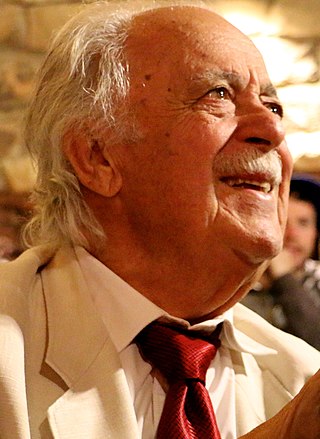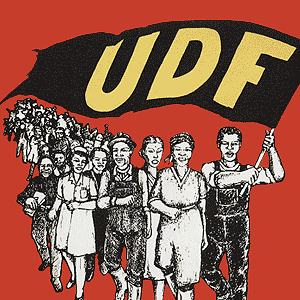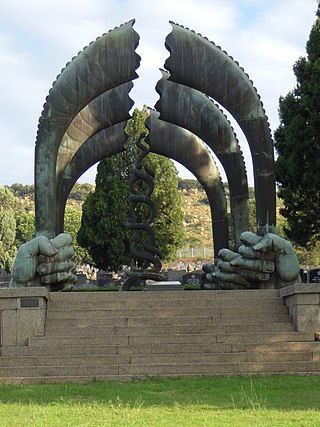
George Bizos was a Greek-South African human rights lawyer who campaigned against apartheid in South Africa. He was noted for representing Nelson Mandela during the Rivonia Trial. He instructed Mandela to add the qualification "if needs be" to his trial address, which is credited with sparing him from a sentence of death. Bizos also represented the families of anti-apartheid activists killed by the government, throughout the hearings of the Truth and Reconciliation Commission.

Ahmed Mohamed Kathrada, sometimes known by the nickname "Kathy", was a South African politician and anti-apartheid activist.

Allan Aubrey Boesak is a South African Dutch Reformed Church cleric and politician and anti-apartheid activist. He was sentenced to prison for fraud in 1999 but was subsequently granted an official pardon and reinstated as a cleric in late 2004.

The United Democratic Front (UDF) was a South African popular front that existed from 1983 to 1991. The UDF comprised more than 400 public organizations including trade unions, students' unions, women's and parachurch organizations. The UDF's goal was to establish a "non-racial, united South Africa in which segregation is abolished and in which society is freed from institutional and systematic racism." Its slogan was "UDF Unites, Apartheid Divides." The Front was established in 1983 to oppose the introduction of the Tricameral Parliament by the white-dominated National Party government, and dissolved in 1991 during the early stages of the transition to democracy.

Derek Andre Hanekom is a South African retired politician, activist and former cabinet minister currently serving as the interim Chairman of South African Airways.

The South African Human Rights Commission (SAHRC) was inaugurated in October 1995 as an independent chapter nine institution. It draws its mandate from the South African Constitution by way of the Human Rights Commission Act of 1994.

Pravin Jamnadas Gordhan is a politician and anti-apartheid activist who has held various ministerial posts in the Cabinet of South Africa. He served as Minister of Finance from 2009 until 2014 and again from 2015 until 2017, as Minister of Cooperative Governance and Traditional Affairs from 2014 until 2015, and as Minister of Public Enterprises since February 2018.
The Johannesburg Central Police Station is a South African Police Service police station in downtown Johannesburg, South Africa. From its unveiling in 1968 until September 1997, it was called John Vorster Square, after Prime Minister B.J. Vorster.
Racism in South Africa can be traced back to the earliest historical accounts of interactions between African, Asian, and European peoples along the coast of Southern Africa. It has existed throughout several centuries of the history of South Africa, dating back to the Dutch colonization of Southern Africa, which started in 1652. Before universal suffrage was achieved in 1994, White South Africans, especially Afrikaners during the period of Apartheid, enjoyed various legally or socially sanctioned privileges and rights that were denied to the indigenous African peoples. Examples of systematic racism over the course of South Africa's history include forced removals, racial inequality and segregation, uneven resource distribution, and disenfranchisement. Racial controversies and politics remain major phenomena in the country.
Africa Now! is a progressive weekly radio show that focuses on issues concerning the African world. It is based in Washington, D.C. The program airs on WPFW(89.3) radio, part of the Pacifica Radio network, in the Washington, D.C. metropolitan area. It also airs nationally and internationally online. It is listener supported.
Amina Cachalia, OLB was a South African anti-Apartheid activist, women's rights activist, and politician. She was a longtime friend and ally of former President Nelson Mandela. Her late husband was political activist Yusuf Cachalia.

Westpark Cemetery is a large cemetery in Johannesburg, South Africa, and is the resting place of some of the country's well-known citizens. It is a non-denomination designated burial ground, and thus has Christian, Jewish, Muslim and Chinese burial areas. The Jewish section contains a Holocaust Memorial, erected in 1959.

The Economic Freedom Fighters (EFF) is a South African left-wing to far-left pan-Africanist and Marxist–Leninist political party. It was founded by expelled former African National Congress Youth League (ANCYL) President Julius Malema, and his allies, in 2013. Malema is President of the EFF, heading the Central Command Team which serves as the central structure of the party. It is currently the third-largest party in both houses of the South African Parliament.
Ismail Ahmed Cachalia (1908-2003), popularly known as Moulvi, was a South African political activist and a leader of Transvaal Indian Congress and the African National Congress. He was one of the leaders of the Indian Passive Resistance Campaign of 1946 and the Defiance Campaign in 1952. The Government of India awarded the fourth highest Indian civilian honour of Padma Shri in 1977.

Black First Land First (BLF) is a black consciousness, pan-Africanist and revolutionary socialist political movement and political party in South Africa. It was founded in 2015 by Andile Mngxitama following his expulsion from the Economic Freedom Fighters (EFF), led by Julius Malema.

Sonia Bunting, OLS was a South African journalist, and a political and anti-apartheid activist. After being charged with treason and imprisoned, being detained a second time, and barred from publishing, she and her husband went into exile in London, where she joined the Anti-Apartheid Movement (AAM) and organised the World Campaign for the Release of South African Political Prisoners. When the African National Congress (ANC) ban was lifted in 1991, she returned to South Africa where she was involved in political activism until her death in 2001. She was posthumously honored by the government of South Africa with the Order of Luthuli in Silver in 2010.

Maximum Security Prison is an inactive prison at Robben Island in Table Bay, 6.9 kilometers (4.3 mi) west of the coast of Bloubergstrand, Cape Town, South Africa. It is prominent because Nobel Laureate and former President of South Africa Nelson Mandela was imprisoned there for 18 of the 27 years he served behind bars before the fall of apartheid. After that, three former inmates of this prison Nelson Mandela, Kgalema Motlanthe, and Jacob Zuma have gone on to become President of South Africa.

Devikarani Priscilla Sewpal Jana was a South African human rights lawyer, politician and diplomat of Indian descent. As a member of the African National Congress (ANC) during the anti-apartheid movement, she participated in both legal activism as well as in the underground movement to end apartheid. She represented many significant figures in the movement, including South African president Nelson Mandela, Winnie Madikizela-Mandela, Steve Biko, Govan Mbeki, Walter Sisulu, and Archbishop Desmond Tutu. Jana was one of the very few South Africans who had access to political prisoners, including Mandela, in the maximum security Robben Island prison, and served as an emissary for coded messages between the political prisoners and the ANC leadership.

The Security Branch of the South African Police, established in 1947 as the Special Branch, was the security police apparatus of the apartheid state in South Africa. From the 1960s to the 1980s, it was one of the three main state entities responsible for intelligence gathering, the others being the Bureau for State Security and the Military Intelligence division of the South African Defence Force. In 1987, at its peak, the Security Branch accounted for only thirteen percent of police personnel, but it wielded great influence as the "elite" service of the police.
Max Coleman was a South African activist and former businessman. He represented the African National Congress (ANC) in the National Assembly from 1994 to 1995 and then served in the South African Human Rights Commission from 1995 to 1996. During apartheid, Coleman was a founding member of the Detainees' Parents' Support Committee, a civil society organisation, after his son was detained for his political activities. Coleman subsequently sold his business in order to organise on the committee's behalf full time.














